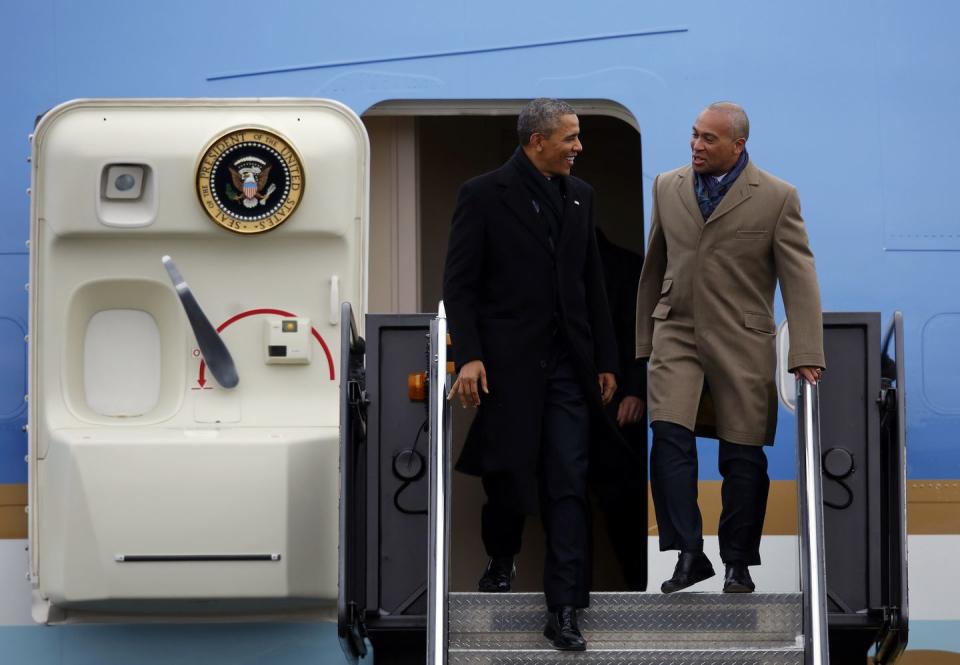There Are a Bunch of Good Reasons Why Deval Patrick Running Is a Bad Idea

In 2006, Deval Patrick delivered this speech to the Massachusetts state Democratic Convention. At the time, Patrick was a long-shot candidate for governor whom people found intriguing, but, in most cases, too intriguing to vote for. The smart money was behind Tom Reilly, the popular, and Irish, and white incumbent attorney general. Early on, the Patrick campaign out-organized everyone in the caucuses around the state. When the convention convened in Worcester, however, Reilly was still favored to be the nominee. When this speech concluded, Patrick had stampeded the gathering and he had developed an irresistible momentum that carried him to two terms as governor. A legend grew up that, at the end of Patrick’s speech, the floor was littered with the campaign buttons of the other candidates. According to Boston political journalist David Bernstein, who was there at the time, this is that rare Massachusetts political legend that actually is true.
You will hear more than a little in that speech that sounds familiar. In many ways, the Patrick campaign in Massachusetts was the test track for themes and messages that, two years later, would carry Barack Obama to the presidency. Hope. Change. We’re all in this together. In fact, during its last, desperate days in the 2008 Democratic primaries, the campaign of Hillary Rodham Clinton tried to hang a plagiarism charge on Obama for lifting some of Patrick’s rhetoric in his stump speeches. It never stuck, largely because Obama and Patrick were such close friends, politically and personally, that the charge sounded ridiculous on its face.
And that brings us to Thursday’s announcement that Deval Patrick is belatedly joining the race for the 2020 Democratic presidential nomination. From The New York Times:
Mr. Patrick’s announcement, which he had signaled this week, came in the form of a video he released early Thursday morning. In it, he said he was running for people who “feel left out” and want a future “not built by somebody better than you, not built for you, but built with you.” “I admire and respect the candidates in the Democratic field,” he said. “They bring a richness of ideas and experience and a depth of character that makes me proud to be a Democrat. But if the character of the candidates is an issue in every election, this time is about the character of the country.”
There are a number of good reasons why this is a bad idea. The field is too full. There are too many centrists already. It’s too late in the process. Patrick missed his window the last time around. Patrick has made a lot of money repping industries that are anathema to the Democratic primary base. He presently works at Bain Capital, and if there’s one thing guaranteed to alienate the rising progressive power in the party, it would be nominating a guy who works for Mitt Romney’s company.
Asked about a number of policy issues that have divided the Democratic candidates, he outlined a set of positions that, taken together, place him closer to the ideological center than the left. He said he did not support “Medicare for all,” but did support a so-called public option; that he was in favor of eliminating or vastly reducing student debt but believed there were “other strategies than we’ve heard about” to do that; and that a wealth tax on the richest Americans “makes a lot of sense directionally” but that he would push for “a much, much simpler tax system for everyone.” “I don’t think that wealth is the problem. I think greed is the problem,” he said, noting that “taxes should go up on the most prosperous and the most fortunate,” but “not as a penalty.”
Well, that’s a pile of mush, isn’t it? Joe Biden could say that stuff, and has. Pete Buttigieg could say that stuff, and has. Cory Booker could say that stuff, and has. Hell, John Delaney could say that stuff, and has. What sense does it make to have another candidate trading in liberal-lite policies and don’t-run-in-the-hallways politics? There is one significant reason: the Obamas want him to.

Back in 2018, in the immediate aftermath of the midterm elections, as the 2020 presidential campaign was emerging from its larval stage, Boston.com noticed an intriguing passage buried in a lengthy New Yorker profile of Deval Patrick. It had been an open secret for years that Patrick’s wife, Diane, had been reluctant to go through the gauntlet of a national political campaign. (Both Deval and Diane Patrick had been quite open about her struggles with depression.) Boston.com called attention to the fact that Michelle Obama personally had lobbied Diane Patrick to get behind a presidential run for Deval. (In 2014, Barack Obama had told an interviewer that he thought Patrick would have been a good candidate in 2016.)
So far in 2020, the Obamas have studiously avoided anything that vaguely looked like a public endorsement of any of the current candidates. If they are behind the sudden re-emergence of Deval Patrick on the national scene, it would surprise practically nobody. After all, the former president is no fan of the Sanders-Warren wing of the field, and his former vice president is wet tinder, and the idea of passing over a group of experienced woman and minority candidates in favor of a 38-year-old white mayor of a mid-sized city can’t be sitting well, either. If anyone can find another way the Patrick candidacy makes sense, I’d like to hear it.
Respond to this post on the Esquire Politics Facebook page here.
You Might Also Like

